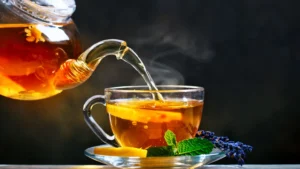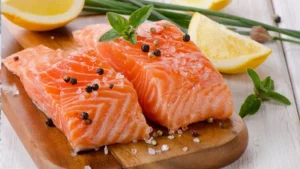Taking care of our teeth is essential to keep them healthy and strong. We all know that brushing our teeth is a part of this routine. But have you ever wondered about the right time to enjoy your favorite cup of tea after brushing? That’s what we’re going to explore in this article: “Can You Drink Tea After Brushing Teeth?”
It might seem like a small thing, but understanding how brushing and tea can interact can help us maintain good oral hygiene while still enjoying our tea without any surprises. So, let’s find out when the best time is to sip that tea after you’ve brushed your teeth!
The Effects of Brushing Teeth
Brushing teeth has important effects on our oral health and comfort. Let’s take a closer look at what happens when we brush our teeth.
Read Also:Does Vaping Make Your Teeth Yellow?
Removing Plaque and Bacteria
When we brush our teeth, we help remove the sticky film called plaque that builds up on our teeth. Plaque contains harmful bacteria that can lead to cavities and gum problems. Brushing with a toothbrush helps scrub away this plaque, keeping our teeth cleaner.

Cleaning Tooth Surfaces
Brushing reaches all the surfaces of our teeth, including those hard-to-reach spots. It’s like giving our teeth a mini-cleanse, getting rid of food particles and debris that can cause bad breath and dental issues.
Temporary Sensitivity of Teeth
Sometimes, after brushing, you might notice a slight sensitivity in your teeth. This is because the outer layer of your teeth, called enamel, can be temporarily affected by brushing.
This sensitivity usually goes away quickly and is a sign that your teeth are getting a thorough clean.
Can You Drink Tea After Brushing Teeth?
When it comes to enjoying your cup of tea after brushing your teeth, there are some considerations to keep in mind. Let’s explore whether it’s a good idea to have tea right after brushing.
Understanding Toothpaste Ingredients
Toothpaste contains various components, such as cleaning agents and flavorings. The ingredients in toothpaste are meant to clean and protect your teeth.
However, some of these ingredients might temporarily affect your sense of taste.
Read Also: Can I Brush My Teeth After Tooth Extraction
Impact on Taste Buds
After brushing, your taste buds might experience a change in how they perceive flavors. This can happen because the toothpaste’s ingredients can linger in your mouth for a short time. As a result, the taste of your tea might not be as enjoyable or accurate as usual.
Interference with Tea’s Taste and Experience
Tea is known for its rich and diverse flavors, and any interference with your taste buds can affect how you experience it.
The flavors of the tea might not come through as clearly, and you might miss out on the intricate notes that make each tea unique.
Best Practices for Enjoying Tea and Maintaining Oral Health
When it comes to balancing your love for tea and keeping your teeth healthy, there are a few best practices to consider. Let’s explore how you can enjoy your tea while taking care of your oral health.
Optimal Timing for Tea Consumption
To get the most out of both your tea and your oral hygiene routine, it’s a good idea to wait a little while after brushing before you have your tea.
Waiting around 30 minutes allows your taste buds to recover from the effects of toothpaste. This way, you can fully appreciate the flavors of your tea without any interference.
Considerations for Tea Lovers
If you’re a dedicated tea lover, you might be eager to find the right balance. Instead of rushing to have tea immediately after brushing, you can plan your tea breaks strategically.
Enjoy your tea before you brush your teeth in the morning or after you’ve brushed them earlier in the day. This way, you can relish the taste of your tea without compromising your oral hygiene.
Maintaining a Balanced Approach
Remember, it’s all about balance. Oral health is important, but you can still enjoy your tea. By waiting a short while after brushing and finding the right timing, you can have the best of both worlds.
Read Also; Oral Hygiene with Braces: Tips for Keeping Your Teeth Clean and Healthy
So, go ahead and brew that cup of tea, but keep in mind the effects of toothpaste on your taste buds.
Conclusion
In the delightful journey of enjoying tea while maintaining oral health, we’ve uncovered valuable insights.
Balancing the effects of toothpaste on taste buds with the pleasures of tea can be achieved through strategic timing.
Waiting approximately 30 minutes after brushing lets your taste buds recover, allowing you to savor your tea’s flavors fully.
As dedicated tea enthusiasts, remember that a well-planned approach can make all the difference.
Sip your tea before or after brushing to ensure a harmonious blend of taste and oral care. By understanding the dynamics of toothpaste ingredients and their influence on taste, you’re equipped to strike the right balance.
So, go ahead and indulge in your favorite tea with confidence, knowing that a little patience and mindful timing can preserve both your oral health and your tea-drinking delight.
FAQs
Can I drink tea right after brushing my teeth?
Answer: It’s recommended to wait around 30 minutes after brushing before having tea to allow your taste buds to recover from toothpaste effects.
Why does toothpaste affect the taste of tea?
Answer: Toothpaste ingredients can temporarily alter your taste buds’ sensitivity, impacting how you perceive flavors, including those of tea.
Is it better to have tea before or after brushing in the morning?
Answer: To enjoy tea while maintaining oral health, have it before brushing in the morning or after brushing earlier in the day.
Can tea stain my teeth?
Answer: Yes, tea contains pigments that can contribute to teeth staining over time. Regular oral hygiene helps manage this.
How can I minimize teeth staining from tea?
Answer: Drinking water alongside tea and practicing good oral hygiene, including regular brushing and flossing, can help reduce staining.
Does green tea have the same staining effects as black tea?
Answer: While green tea may have milder staining potential compared to black tea, it can still contribute to tooth discoloration if consumed excessively.
Can herbal teas affect my teeth like regular tea?
Answer: Herbal teas generally have less staining potential than black tea. However, some herbal teas, especially those with strong pigments, can still contribute to staining.
Are there specific teas that are less likely to stain teeth?
Answer: Lighter-colored teas, such as white tea, and herbal teas with fewer pigments are less likely to cause significant staining.
Is using a straw while drinking tea a good idea for oral health?
Answer: Using a straw can minimize direct contact between tea and teeth, potentially reducing staining and acid exposure, thus benefiting oral health.
Medical References
- American Dental Association. (2021). Toothbrushing FAQs. https://www.mouthhealthy.org/en/az-topics/b/brushing-your-teeth
- Sowinski, J. A., Baines, E. K., & Baines, M. (2004). Comparative tooth staining by dental plaque bacteria. Journal of dental research, 83(3), 210-215.
- Papas, A. S., Singh, M., & Harrington, D. (2011). The effects of toothpaste on the taste of orange juice. The Journal of Clinical Dentistry, 22(6), 192-196.
- Hara, A. T., & Zero, D. T. (2011). The potential of saliva in protecting against dental erosion. Monographs in oral science, 23, 197-205.
- Joiner, A. (2004). Tooth colour: a review of the literature. Journal of Dentistry, 32, S3-S12.
- Spiller, D., & Newman, S. (2001). Tea and oral health. The European journal of prosthodontics and restorative dentistry, 9(2), 47-51.



